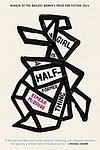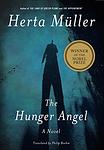The Greatest "Modernist, Fiction, Social & Cultural Fiction" Books Since 1970
Click to learn how this list is calculated.
This list represents a comprehensive and trusted collection of the greatest books. Developed through a specialized algorithm, it brings together 300 'best of' book lists to form a definitive guide to the world's most acclaimed books. For those interested in how these books are chosen, additional details can be found on the rankings page.
Genres
Modernist literature is a category of books that emerged in the early 20th century, characterized by a break from traditional literary forms and a focus on individual experience and perception. Modernist writers experimented with language, form, and structure, often using stream-of-consciousness narration and fragmented storytelling to convey the complexity and ambiguity of modern life. Themes of alienation, disillusionment, and the search for meaning are common in modernist literature, which reflects the cultural and social upheavals of the time. Overall, modernist literature is a challenging and thought-provoking genre that continues to influence contemporary literature and culture.
Social & Cultural Fiction is a literary category that encompasses novels and stories that delve into the complexities of society and culture, exploring themes such as class, race, gender, and identity within specific social contexts. These narratives often provide a lens through which readers can examine the intricacies of human relationships and the impact of cultural norms and societal structures on individuals and communities. By offering a fictional yet reflective portrayal of real-world social dynamics, this genre invites readers to gain a deeper understanding of the diverse experiences that shape our world. Authors in this category frequently use their characters and settings to comment on contemporary issues, challenge prevailing ideologies, and provoke thought about the possibility of social change, making Social & Cultural Fiction a powerful tool for empathy and a mirror for the ever-evolving human condition.
Countries
Date Range
Reading Statistics
Click the button below to see how many of these books you've read!
Download
If you're interested in downloading this list as a CSV file for use in a spreadsheet application, you can easily do so by clicking the button below. Please note that to ensure a manageable file size and faster download, the CSV will include details for only the first 500 books.
Download-
1. Franz Kafka: The Complete Stories by Franz Kafka
This collection of stories offers a comprehensive look at the work of a renowned author, known for his surreal and often unsettling depictions of modern life. The stories explore themes of existential anxiety, guilt, and absurdity, often through narratives in which ordinary people face extraordinary, inexplicable circumstances. The collection showcases the author's unique style and his profound influence on 20th-century literature.
-
2. Gravity's Rainbow by Thomas Pynchon
Set during the end of World War II, the novel follows Tyrone Slothrop, a lieutenant in the U.S. Army, as he tries to uncover the truth behind a mysterious device, the "Schwarzgerät", that the Germans are using in their V-2 rockets. The narrative is complex and multi-layered, filled with a vast array of characters and subplots, all connected by various themes such as paranoia, technology, and the destructive nature of war. The book is known for its encyclopedic nature and its challenging, postmodernist style.
-
3. Extinction by Thomas Bernhard
"Extinction" is a novel that explores the dark and complex themes of family, identity, and history through the eyes of its protagonist, a professor living in Rome. When he receives news of the deaths of his parents and brother in a car accident, he is forced to confront his past and his Austrian heritage. The narrative delves into his thoughts and feelings, his criticisms of his family and society, and his philosophical musings on life and death, all while he prepares to return to his family's estate for the funeral. The novel is renowned for its dense, stream-of-consciousness style and its unflinching examination of the human condition.
-
4. Concrete by Thomas Bernhard
The book is a darkly introspective narrative that delves into the mind of a reclusive, obsessive intellectual who is struggling to complete his scholarly work on the composer Mendelssohn. As he grapples with his own ailments and the perceived mediocrity of his surroundings, the protagonist's stream-of-consciousness monologue reveals his deep-seated anxieties, self-loathing, and profound isolation. The narrative is a relentless examination of the protagonist's psyche, showcasing his critical view of society and his own personal relationships, which are fraught with tension and dysfunction. Through this, the novel explores themes of artistic creation, intellectual elitism, and the suffocating nature of expectations and familial obligations.
-
5. Woodcutters by Thomas Bernhard
Woodcutters is a darkly humorous critique of Vienna's artistic elite. The story takes place over the course of a single evening, as the narrator attends a dinner party in honor of a recently successful actor. As the evening progresses, he reflects on the pretentiousness and hypocrisy of the guests, the mediocrity of their artistic achievements, and the tragic suicide of his former lover. The novel is a scathing indictment of the vanity and self-delusion of the artistic community.
-
6. In the Heart of the Country by J M Coetzee
Set in South Africa, this novel tells the story of a woman living on a remote farm who is isolated not only geographically but also emotionally and psychologically. After her father marries his young mistress, the protagonist's life spirals into madness and tragedy. The narrative explores themes of loneliness, power dynamics, and the harsh realities of life in apartheid-era South Africa, all presented through the protagonist's fragmented and unreliable perspective.
-
7. Happy Moscow by Andrey Platonov
"Happy Moscow" is a satirical novel set in the Soviet Union during the height of Stalinist rule, following the life of a young woman, Moscow Chestnova, who is named after the capital city. Despite the harsh realities of life under an authoritarian regime, she maintains a positive and optimistic outlook, symbolizing the Soviet Union's propaganda that promoted an image of a happy and prosperous society. The novel, through its characters and their experiences, explores the paradoxes and contradictions of the Soviet society, challenging the official narrative of happiness and prosperity.
-
8. Wittgenstein's Nephew by Thomas Bernhard
"Wittgenstein's Nephew" is a semi-autobiographical novel that explores the friendship between the narrator and his friend Paul, who is the nephew of the famous philosopher Ludwig Wittgenstein. The story takes place in Vienna and is set against the backdrop of the Austrian mental health system. The novel delves into themes of sanity, insanity, and the fine line that separates the two, while also offering a critique of Austrian society. It is a meditation on the nature of illness, both physical and mental, and the impact it has on personal relationships and one's perception of the world.
-
9. House Of Hunger by Dambudzo Marechera
"House of Hunger" is a powerful collection of stories and poems that vividly depict the struggles and despair experienced by the marginalized individuals living in post-colonial Zimbabwe. Through a raw and fragmented narrative style, the author explores themes of poverty, violence, and the loss of cultural identity, providing a haunting portrayal of a society grappling with the aftermath of colonialism. Marechera's poignant and thought-provoking work serves as a powerful critique of social and political injustices, leaving readers both disturbed and enlightened.
-
10. Childhood by Nathalie Sarraute
"Childhood" is a memoir that delves into the fragmented memories of the author's early years, exploring the complexities of growing up and the formation of identity. Through a series of vignettes, the narrative captures the nuanced emotions and experiences of a young girl navigating her way through the challenges of family dynamics, societal expectations, and self-discovery. The author employs an innovative literary style, characterized by introspection and a stream-of-consciousness approach, to reflect on the elusive nature of memory and the ways in which our childhood experiences shape who we become.
-
11. A Girl Is A Half Formed Thing by Eimear McBride
"A Girl Is A Half Formed Thing" is a powerful and experimental novel that delves into the psyche of a young woman as she navigates through a tumultuous and abusive childhood, her complex relationship with her mentally and physically disabled brother, and her own journey towards self-discovery and identity. Written in a unique stream-of-consciousness style, the book explores themes of trauma, sexuality, religion, and resilience, offering a raw and unflinching portrayal of the human experience.
-
12. The Hunger Angel by Herta Müller
"The Hunger Angel" is a poignant novel that explores the harrowing experiences of a young man deported to a Soviet labor camp after World War II. The narrative delves into the psychological and physical toll of life in the camp, where the protagonist grapples with extreme hunger, harsh conditions, and the struggle to maintain a sense of identity and humanity. Through lyrical and evocative prose, the book captures the intense emotions and survival mechanisms of those ensnared in the brutal realities of historical political oppression.
Reading Statistics
Click the button below to see how many of these books you've read!
Download
If you're interested in downloading this list as a CSV file for use in a spreadsheet application, you can easily do so by clicking the button below. Please note that to ensure a manageable file size and faster download, the CSV will include details for only the first 500 books.
Download










